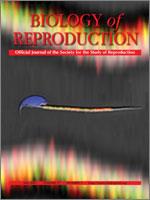Studies in both mammalian and nonmammalian ovarian model systems have demonstrated that activation of the mitogen-activated protein kinase (MAPK) and protein kinase C (PKC) signaling pathways modulates steroid biosynthesis during follicle development, yet the collective evidence for facilitory versus inhibitory roles of these pathways is inconsistent. The present studies in the hen ovary describe the changing role of MAPK and PKC signaling in the regulation of steroidogenic acute regulatory protein (STAR) expression and progesterone production in undifferentiated granulosa cells collected from prehierarchal follicles prior to follicle selection versus differentiated granulosa from preovulatory follicles subsequent to selection. Treatment of undifferentiated granulosa cells with a selective epidermal growth factor receptor (EGFR) and ERBB4 receptor tyrosine kinase inhibitor (AG1478) both augments FSH receptor (Fshr) mRNA expression and initiates progesterone production. Conversely, selective inhibitors of both EGFR/ERBB4 and MAPK activity attenuate steroidogenesis in differentiated granulosa cells subsequent to follicle selection. In addition, inhibition of PKC signaling with GF109203X augments FSH-induced Fshr mRNA plus STAR protein expression and initiates progesterone synthesis in undifferentiated granulosa cells, but inhibits both gonadotropin-induced STAR expression and progesterone production in differentiated granulosa. Granulosa cells from the most recently selected (9- to 12-mm) follicle represent a stage of transition as inhibition of MAPK signaling promotes, while inhibition of PKC signaling blocks gonadotropin-induced progesterone production. Collectively, these data describe stage-of-development-related changes in cell signaling whereby the differentiation-inhibiting actions of MAPK and PKC signaling in prehierarchal follicle granulosa cells undergo a transition at the time of follicle selection to become obligatory for gonadotropin-stimulated progesterone production in differentiated granulosa from preovulatory follicles.
How to translate text using browser tools
1 July 2007
Actions of Epidermal Growth Factor Receptor/Mitogen-Activated Protein Kinase and Protein Kinase C Signaling in Granulosa Cells from Gallus gallus Are Dependent upon Stage of Differentiation
Dori C. Woods,
Morgan J. Haugen,
A. L. Johnson
ACCESS THE FULL ARTICLE

Biology of Reproduction
Vol. 77 • No. 1
July 2007
Vol. 77 • No. 1
July 2007
follicle
granulosa cells
MAP kinase
ovary
PKC
progesterone
signal transducers




